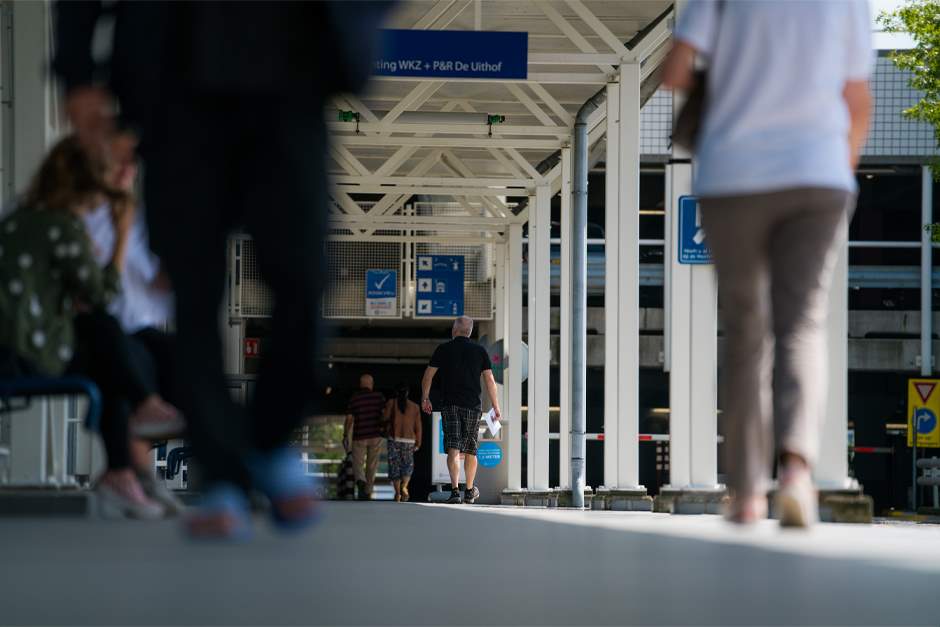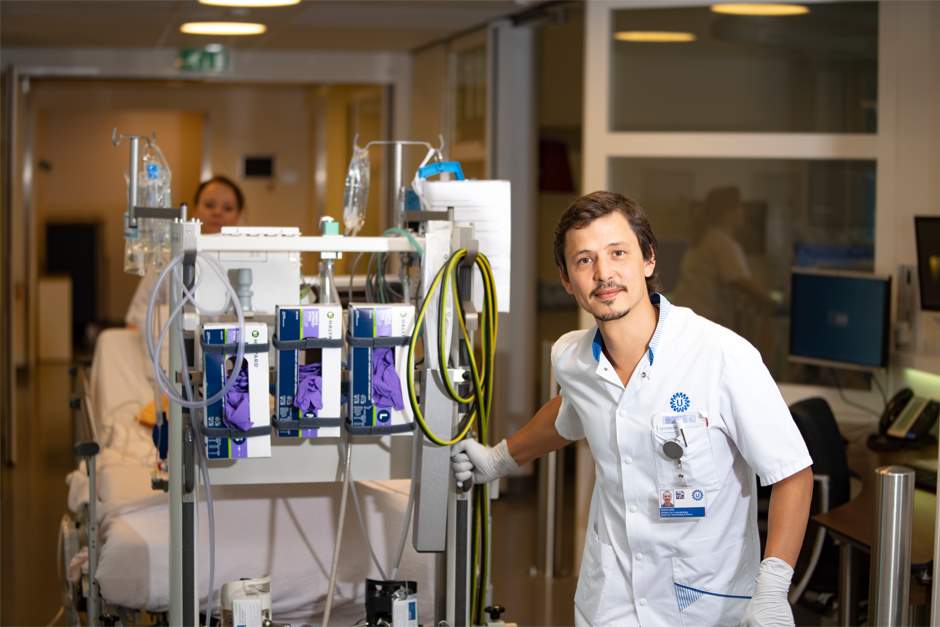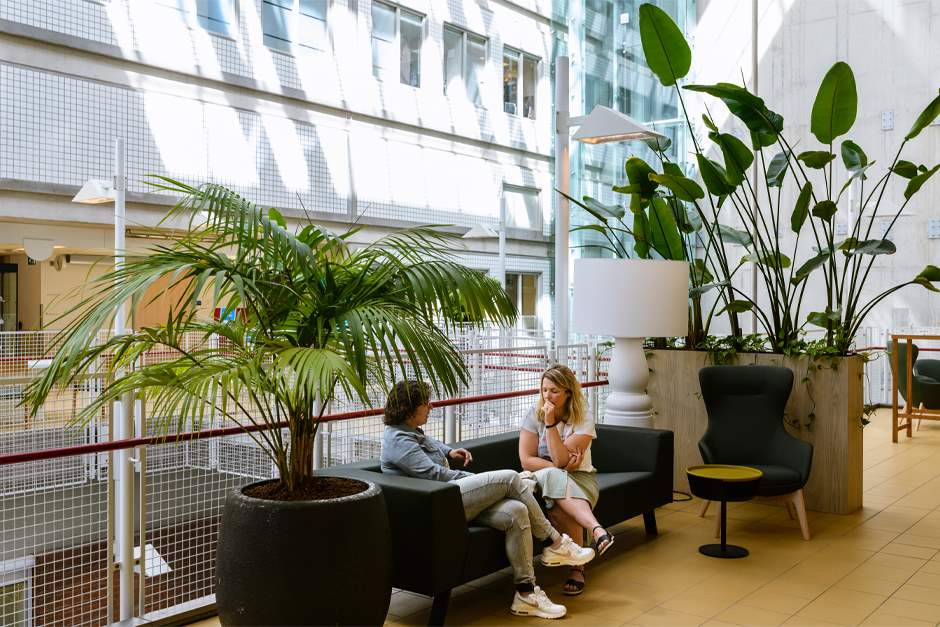Our tasks
Our mission and vision determine our direction for the coming years. Our dot on the horizon is clear: together creating the healthcare of tomorrow. Via our focal points and accelerators in our Connecting Worlds strategy, we build daily to accomplish this goal. The world however is not standing still. We are not living in a period of change, but in a change of a period itself. Healthcare too stands on the brink of a significant transition. We have a significant role to play in social challenges regarding healthcare and are facing substantial tasks. This requires agility. From our position as a university medical center we feel the responsibility to fulfill our social role.

Integral Healthcare Agreement (IZA)
As UMC Utrecht we have actively been following up on the Integral Healthcare Agreement or Integraal Zorgakkoord (IZA) . The assignments and ideas contained in the IZA align seamlessly with our strategy and the initiatives that we had already implemented according to our strategy. For us, the IZA confirms the direction that we had already taken and the tasks that we are integrally working on. In 2023 there was however an acceleration. The IZA demands collaboration across all domains , in the region specifically, but also nationwide. We have therefore invested in collaboration with various partners. We have for instance made a significant contribution to Regiobeeld Midden Nederland (regional overview of Central Netherlands) , through the role that we play in Health Hub Utrecht , and through base-building with data from the Julius Center and UMC Utrecht.
Based on the regional overview (Regiobeeld) we know where the greatest challenges for medical-specialist care in our region will be in the coming years. We are a relatively young region, with many births expected in the coming years. At the same time there is also a dual aging of the population, which is stronger than the average for the Netherlands. Lifestyle-related diseases and mental problems are also increasing among younger people. This implies a steep rise in healthcare with these target groups. It is expected that the demand for academic healthcare in the region will increase with just about 15% in the coming years. This while Utrecht, due to the high demographic pressure in the region, is also experiencing a very tight job market.

Based on the analysis of IZA assignments, our strategy, and tasks in the region, we as UMC Utrecht have also drawn up our own agenda with a specific IZA focus. Via six topics, driven by two academic leads per topic (in-house professionals with end responsibility), we are formulating our IZA work agenda for the coming years in line with our strategy and regional collaborations. These topics are: Acute Care, Healthy Lifestyle & Prevention, Network Healthcare, Value-driven Healthcare, Digitization & Hybrid Healthcare, and Labor Market & Training. Via this structure we feed targeted input to the various IZA panels in the region on these topics and advise the manager who is part of it. At the same time, assignments from these regional panels are given to the academic leads of each specific topic, who in turn supervise the whole. With this structure and with the subject experts we add focus to the IZA tasks for UMC Utrecht, and bring it all together by giving the leads as a group guidelines for the whole. This is after all what the name integral healthcare agreement implies. Our IZA agenda and our strategic direction have thus been streamlined. We therefore see the IZA not as something extra, but as part of the direction we are taking.
Appropriate care
An important part of the Integral Healthcare Agreement (IZA) is appropriate care. Appropriate care is healthcare that works, at an affordable price. This implies that our patients and healthcare professionals decide together on the care that they will receive. It also means that we organize healthcare as close tot he patients as possible. At home if we can. And appropriate care is not only about disease, but also about health, prevention and self-reliance. Appropriate care ensures that patients receive better care that suits them, that healthcare costs are kept in check, that promising new treatments and drugs remain accessible, and that there is less pressure on healthcare professionals. Appropriate care therefore also provides a stimulus to think about sustainability. It puts the breaks on over treatment and thus reduces wastefulness. After all, the most sustainable care is the care that we can prevent.
Green Deal for ustainable Healthcare 3.0
As a university medical center we work on the improvement of health for everyone and help people to live a healthy life and prevent disease. However, the healthcare sector in the Netherlands is responsible for 7% of the country’s CO2 footprint, 4% of its waste, and 13% of its use of commodities (metals and minerals). By delivering healthcare, we as a sector are therefore paradoxically contributing amply to the environmental crisis and growing demand for care. This is why the healthcare sector wants to provide sustainable healthcare, research and education: green and climate-neutral with minimal greenhouse-gas emissions and a minimal negative impact on the habitat. In the Green Deal for Sustainable Healthcare 3.0, partners have agreed to speed up considerably in making healthcare more sustainable for five topics from 2023 until 2026.
UMC Utrecht has of course also signed the Green Deal for Sustainable Healthcare. This is perfectly in line with our mission and vision to work daily on improving the health of people and of the society, also for generations to come. We increase our positive impact on health by reducing our negative impact on the environment and climate. Through various initiatives and projects we are taking steps to fulfill our ambitions for future-proof healthcare, research, and education, and to integrate these in our operational management. And we inspire our people to contribute in turn to the quality of life of our planet and society. Read more about this in the chapter Sustainability .
Uncertainty surrounding the funding of research and education
To reach our goals in scientific research and education and remain a progressive academic center, besides external research funding and non-profit organizations, we are highly dependent on government institutions. The national and international (political) landscape is however greatly subject to change. This also causes uncertainty about available funds for education. However, there is particular uncertainty regarding the availability of research funding in the future. In 2024 for example, following a vote in the Second Chamber, it was announced that the opening of round four of the National Growth Fund would be postponed until further notice. We therefore need to anticipate on international and national developments and make optimal use of research-funding opportunities when they arises.
Renovations
UMC Utrecht is building the university medical center of the future: a place where the best care for our patients, a pleasant work environment for our employees, an optimal training climate for our students, and state-of-the-art research facilities come together.


UMC Utrecht was built 35 years ago and since then, developments in the fields of healthcare, education, and technology have been taking place steadily. Patient care is now delivered remotely when possible, our office people work partly from home or from another location, and our students no longer come to UMC Utrecht for all their activities. This means that the needs in terms of buildings are not the same as before. Our physical environment, the Utrecht Science Park, has also changed considerably. We are therefore renovating but also adding new components. We are aiming for sustainable , efficient, and flexible and take the needs of the users of buildings and spaces as a departure point.
Digitalization
Digitalization offers many opportunities. Digital equipment makes it easier to deliver care in any location. Patients can be monitored at home and where necessary receive remote support from healthcare professionals. Our aim is to work digitally in the future, unless it is necessary to do otherwise. Patients will then only come to the hospital for acute and complex care that cannot be provided at home. Digitalization brings a fundamental change in the relationship with our patients. And the role of data keeps growing. Artificial intelligence (AI) is contributing significantly to prevention, prognosis and diagnosis. Through these developments we are acquiring the role more of a live-in coach for our patients and a reliable partner. The time that is freed up through digitalization is used for our patients, so that we can give them even more personalized care and attention. Besides healthcare, digitalization is also taking place in our education and research. Digitalization also brings risks. Besides the risk that our IT infrastructure does not adequately support this development, we further run a compliance risk for example in terms of privacy, and risks related to IT security (e.g. hacks or ransomware).
The ‘Privacy in Control’ approach enables us to achieve our strategic goals in terms of digitalization, data-driven work methods, and transmural cooperation, whereby the privacy of patients and employees is guaranteed and the aforementioned risks are minimized. This approach ensures that each digital application is developed from the design phase with privacy and security as core functions (‘privacy en security by design’). Information security and privacy are therefore not only part of the deployed digital technologies, but also of all quality processes in healthcare, scientific research, and education.
Transforming our organization
Doing the right things is one thereof. Doing things well is another. Even more so in a time of scarcity. For this we need to organize our processes better, working in a more harmonized way, having a better idea of our capacity, and becoming more flexibility. We can use the available time to tackle as may core tasks as possible. This will bring us closer to our dot on the horizon. A uniform approach will us the necessary grip and clout and make it easier to work together efficiently. Thereby we can make better use of our capacity, become an agile, fast-moving organization, and keep innovating. To achieve this, we are rethinking our organizational structure. We must organize ourselves in in such a way that our organizational structure supports the movement that we need to pursue and the goals we want to achieve. This will enable us to innovate faster, cooperate better with each other as well as our partners
, and cope with changes more effectively.
It is of course our people who will make the difference and fulfill our ambitions. To demonstrate the agility that is so important, we must ensure that our colleagues
are and remain satisfied and involved.